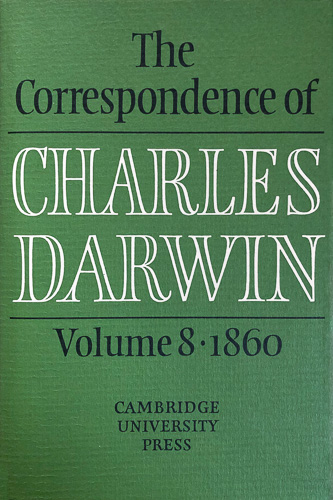
In my opinion, the magnificent, multi-volume Correspondence of Charles Darwin is by far the best way we 21st-century fans have of getting to know our hero. Here is Darwin talking privately among friends (and a few enemies). And every single letter both to and from Darwin is annotated with meticulously researched footnotes explaining its context and references.
This particular volume comprises Darwin’s correspondence for the year 1860—that is, in the immediate aftermath of the publication of the first edition of On the Origin of Species. Here we encounter many of the initial responses to his revolutionary book from the people whose opinions Darwin most cared about: his fellow scientists. Some are extremely positive, some politely non-committal, and a few downright scathing. As the months progress, Darwin begins to build a list of who has been won over by his one long argument, who goes with him some way (and will perhaps, with encouragement, go further), and who should be written off as a lost cause.
This volume also reveals Darwin the shrewd tactician, developing allegiances, encouraging third-party rebuttals to negative reviews, and scheming to bring positive reviews to a wider audience. We also encounter a good deal of frustration on Darwin’s behalf at readers (sometimes wilfully) failing to appreciate his strongest arguments in favour of his theory, while seizing on those that Darwin himself acknowledged were the weakest. (You’d better get used to it, Mr D!)
As always, individual letters provide fascinating insights into Darwin’s thinking. In this volume, we read him, among many other things:
- comparing evolutionary links between species to a network, as well as to the more familiar tree;
- thriftily admonishing his amanuensis for not writing on both sides of the paper;
- realising he should have credited Alfred Russel Wallace more for independently arriving at the idea of Natural Selection (something he would remedy in later editions of Origin);
- being impressed with his publisher at his having managed to get copies of Origin into railway bookstalls;
- regretting certain passages in Origin that he would later amend or drop altogether;
- sending his former servant aboard HMS Beagle an ear-trumpet to help with his increasing deafness;
- emphasising the importance of different traits in species being linked together in some way;
- feeling sick at the very thought of a peacock’s tail;
- accusing Prince Albert (behind his back) of impertinence;
- failing to see how a benevolent creator could allow the pupae of parasitic wasps to eat their hosts from the inside;
- congratulating his friend Charles Lyell on raising some excellent, insightful objections to his theory;
- explaining that dominant species in one environment would by no means necessarily be the dominant species in a different environment;
- speculating that, were all vertebrates except reptiles to be wiped out, mammals would not evolve again from the remaining reptiles;
- confessing how easily he is distracted from his planned work;
- noting how having a theory by which to work affects your observational skills;
- predicting that his theory will only be generally accepted once the old guard has been superseded by younger scientists.
As with all the volumes in this series, this book is really aimed at people with a serious interest in Darwin. And, as with all the other volumes, it is absolutely magnificent.
- Buy this book from Bookshop.org (UK) and help tax-paying, independent bookshops.
- Buy this book from Amazon.co.uk
- Buy this book from Amazon.com